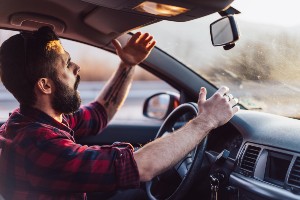
Although often used interchangeably, aggressive driving and road rage is not the same thing. Aggressive driving can be a part of road rage. For instance, speeding, tailgating, or improper lane usage is considered aggressive driving. Drivers engaging in these behaviors can become uncontrollably angry and hostile. Instances of road rage include cursing, obscene gestures or throwing items.
If you are involved in a road rage incident, it is important to remain cautious when dealing with the other driver. You do not want to say or do anything that might make this individual more upset and put you in harm’s way. Below, we discuss what to do after a car crash involving road rage to help keep you safe and preserve your claim for compensation.
An experienced West Palm Beach car crash lawyer is prepared to review your situation and discuss your potential legal options in a free initial consultation. You are not obligated to hire our firm afterward.
How Common Are Aggressive Driving Behaviors?
Aggressive driving on Florida roadways is more common than you may think. The state defines aggressive driving as committing one or more of the following acts at the same time:
- Exceeding the posted speed limit
- Making unsafe/improper lane changes
- Following another car too closely
- Failing to yield the right of way
- Improperly passing another car
- Violating traffic lights and signals
Drivers who engage in aggressive driving behaviors can become angry and resort to road rage.
Recognizing Road Rage While Sharing the Roadway
Every driver experiences frustration when behind the wheel. However, road rage is not limited to honking or yelling at bad drivers. Some extreme forms of aggressive driving can lead to road rage.
It often involves a driver:
- Verbally insulting and yelling
- Making rude or inappropriate gestures
- Threatening acts of violence
- Attempting to intimidate
- Physically confronting someone
- Sideswiping or ramming into other cars
It is hard to pinpoint the causes of road rage. A driver may be set off by a slow driver. Another driver may just be having a rough day. In any case, there is no reason for driving in such a manner.
Staying Safe as a Victim of a Road Rage Crash
After a road rage crash, it is best to stay in your car, especially in heavy traffic. If you leave your car, you may be putting yourself in danger.
If the other driver is cursing or yelling at you or gets out of his or her car, keep your doors locked and windows up. A driver in a fit of road rage may attempt to confront you or open your door.
It is important that you remain calm to help deescalate the situation. Some ways to stay safe include:
- Avoid eye contact – Making eye contact with the other driver could further upset him or her. Keep your eyes on the road and try to not make eye contact with the enraged driver.
- Avoid escalation – If the other driver yells at you or makes gestures, do not shout or gesture back. If the other driver cuts you off, tailgates or drives aggressively, you may be inclined to honk your horn or otherwise engage with him or her. However, it is best to remain calm and ignore them.
- Call the police – It is advisable to report incidents of aggressive driving or road rage to Florida law enforcement. Call 9-1-1 if you feel in any danger or an angry driver approaches your car.
- Drive to a safe place – Head to a police station, convenience store, shopping center, hospital or another public place. This will usually discourage a road rage driver from escalating things.
Preserving Your Claim for Compensation
Aside from protecting your well-being, there are certain things you can do to help preserve your claim for compensation after a road rage crash. A lawyer at our firm is ready to help you during this process.
Be sure to write down everything you can remember. You do not want to forget important details from the crash. How did the crash happen? How were you injured? What was the other driver doing?
Gather as much evidence as you can, such as surveillance footage from a nearby business or video footage from a bystander. Take pictures of the accident scene, your injuries and property damage.
Seek medical care, even if you think your injuries are minor. It is important to be examined, diagnosed and treated by a doctor. Medical records can be a critical piece of evidence in a claim.
Additionally, be careful about what you say to the insurance company. Insurers like to use certain tactics in an attempt to devalue or deny claims. An insurance adjuster will look for any reason to assign you full or partial fault for the crash. Be honest, but only provide the basic details of what happened. If you have a viable claim, we are ready to prepare you for the questions you may be asked about the crash.
Request a Free Initial Consultation to Get Started
Gordon & Partners has been providing legal counsel to Florida residents for 25 years. To date, our lawyers have recovered millions of dollars in compensation for our clients, including car accident victims. We stand ready to fight for your rights and best interests every step of the way.
There is no risk in calling us to learn more about your available legal options and no obligation to retain our services. We also charge nothing up front and only receive payment if compensation is recovered.
